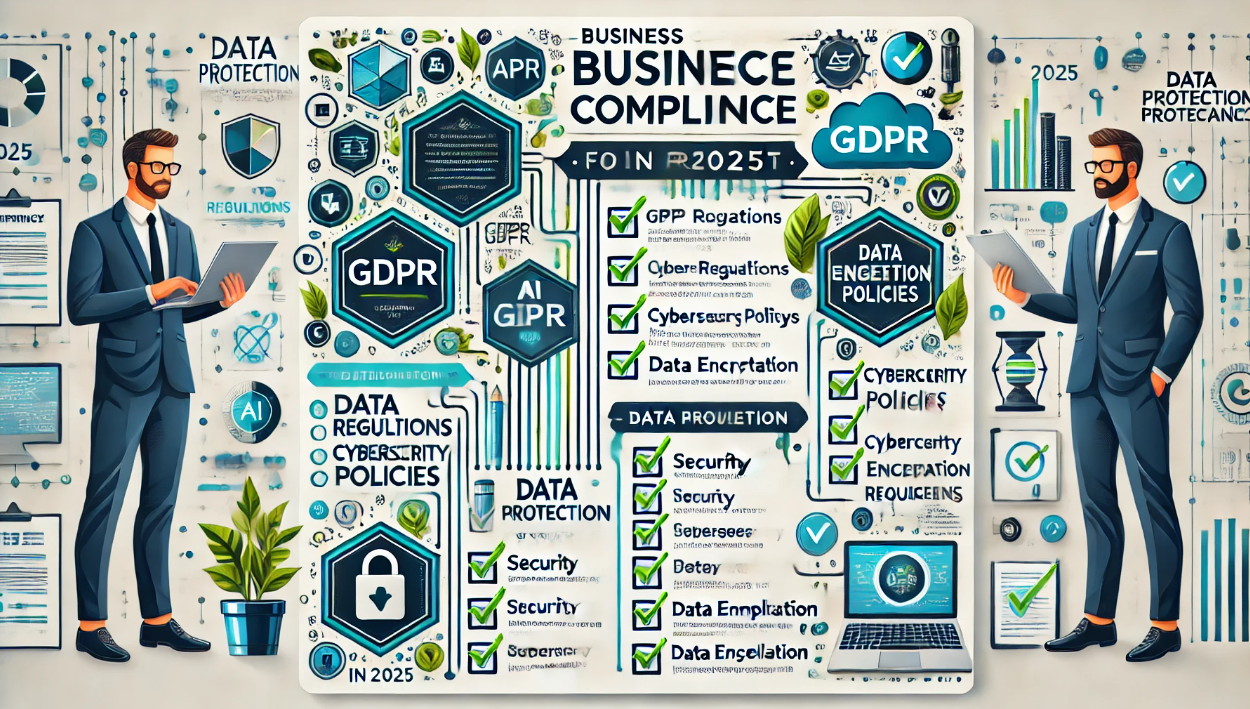IT Compliance and Privacy Laws in 2025: What Businesses Need to Know
As technology evolves, so do IT compliance and privacy laws. In 2025, businesses must stay ahead of new regulations governing data protection, AI governance, and cybersecurity to avoid hefty fines and legal issues.
In this guide, we’ll cover key compliance updates, major regulations like GDPR and AI laws, and steps businesses need to take to stay compliant.
1. Why IT Compliance Matters in 2025
✔ Regulations are getting stricter – Governments worldwide are strengthening data privacy laws.
✔ AI and automation are under scrutiny – Businesses using AI must ensure ethical and transparent practices.
✔ Cyber threats are rising – New cybersecurity standards are being enforced to protect consumer data.
Failure to comply can result in:
❌ Fines up to €20 million or 4% of annual revenue under GDPR.
❌ Bans on AI-powered decision-making if found non-compliant.
❌ Class-action lawsuits for data breaches or privacy violations.
Tip: Compliance isn’t just about avoiding fines—it builds trust with customers and partners.
2. Key IT Compliance Regulations for 2025
✅ 1. GDPR 2.0 – The Next Evolution of Data Privacy
The General Data Protection Regulation (GDPR) remains the gold standard for data privacy in the EU, but 2025 updates introduce:
✔ Stricter consent rules – Businesses must provide clearer opt-ins for data collection.
✔ Higher fines for non-compliance – Authorities are doubling down on enforcement.
✔ AI and algorithm transparency – Any AI-powered decisions affecting individuals must be explainable.
Who Needs to Comply?
Any company handling EU citizen data, regardless of location.
How to Stay Compliant:
✔ Update privacy policies to reflect explicit user consent.
✔ Audit AI-driven decision-making for fairness and bias.
✔ Implement automated data deletion policies upon user request.
✅ 2. AI Governance and Ethics Laws
The EU AI Act and U.S. AI Bill of Rights introduce strict regulations on:
✔ AI-powered hiring tools – Preventing bias in recruitment decisions.
✔ Facial recognition & surveillance AI – Restricting unauthorized use.
✔ AI decision-making transparency – Ensuring fairness in financial and healthcare AI.
How to Stay Compliant:
✔ Document how AI models make decisions (Explainability).
✔ Implement human oversight in AI-driven processes.
✔ Conduct AI risk assessments for ethical concerns.
✅ 3. U.S. Data Privacy Laws – State-Level Expansion
In 2025, California (CCPA/CPRA), Virginia, Colorado, and other states enforce stricter privacy laws:
✔ The California Privacy Rights Act (CPRA) expands consumer rights to opt-out of automated profiling.
✔ Virginia Consumer Data Protection Act (VCDPA) requires businesses to conduct data protection impact assessments.
✔ Federal Privacy Law (Pending) – The U.S. is debating a nationwide data protection act similar to GDPR.
How to Stay Compliant:
✔ Review state-specific laws if operating in the U.S.
✔ Offer clear opt-out mechanisms for data collection.
✔ Strengthen data encryption and security protocols.
✅ 4. ISO 42001 – The First Global AI Management Standard
In 2025, ISO 42001 introduces a global AI compliance framework, requiring companies to:
✔ Ensure AI models are fair, explainable, and unbiased.
✔ Conduct risk assessments on AI-powered decision-making.
✔ Implement AI governance teams to oversee ethical AI usage.
Who Needs to Comply?
✔ Enterprises using AI-powered automation, chatbots, and analytics tools.
✔ Businesses offering AI-powered services like finance, HR, and healthcare.
3. How Businesses Can Stay Compliant in 2025
✅ 1. Conduct Regular Compliance Audits ️
✔ Review policies for GDPR, AI laws, and data protection.
✔ Perform internal and external security audits.
✔ Ensure third-party vendors comply with the latest regulations.
✅ 2. Strengthen Data Security Practices
✔ Encrypt sensitive data at rest and in transit.
✔ Use Zero Trust Security to restrict access.
✔ Implement Multi-Factor Authentication (MFA) across company logins.
✅ 3. Improve Transparency and User Control
✔ Update privacy policies for clarity.
✔ Allow users to opt out of tracking and AI decision-making.
✔ Automate data deletion and compliance reporting.
✅ 4. Train Employees on Compliance Best Practices
✔ Conduct mandatory cybersecurity & privacy training.
✔ Educate teams on AI ethics and responsible data usage.
✔ Ensure employees understand phishing and data breach prevention.
4. Penalties for Non-Compliance: What’s at Stake?
GDPR 2.0 Fines – Up to €20M or 4% of global revenue.
CCPA/CPRA Violations – Up to $7,500 per record.
AI Governance Fines – Severe restrictions on AI usage for non-compliant companies.
Tip: Proactive compliance is cheaper than paying fines or losing customer trust.
Final Thoughts: Stay Ahead of Compliance in 2025
IT compliance is evolving rapidly—businesses must adapt to avoid legal risks. Follow these key steps to stay compliant:
✔ Stay updated on GDPR, AI laws, and state privacy regulations.
✔ Strengthen cybersecurity, encryption, and Zero Trust Security models.
✔ Ensure transparency in AI decision-making and data processing.
✔ Regularly audit internal systems and third-party vendors.
Want to stay compliant and secure in 2025? Start updating your IT policies today!

